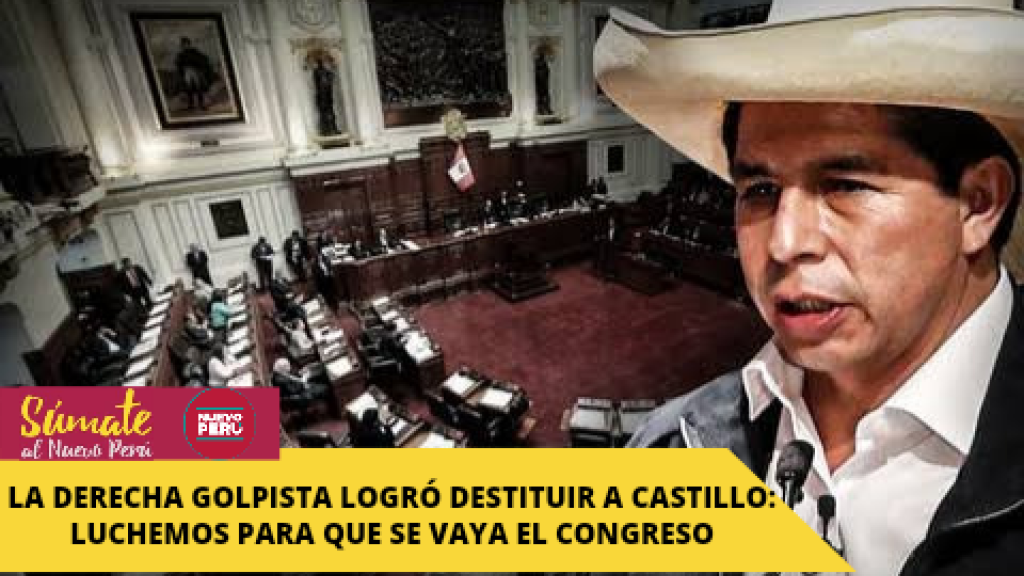Peru: The right-wing coup plotters have overthrown Castillo — Let’s fight for the fall of Congress

From the first moment that the right wing discovered it had been defeated in the second round of Peru’s general elections, this same racist and classist political, business and media-owning right refused to accept that a sombrero-wearing rural teacher and Quechua-speaker from the countryside could be president. Even though Pedro Castillo did not threaten to put at jeopardy the economic interests of the business class and represented a continuity in terms of neoliberal policies, they could not accept that a president with these characteristics could win the elections; classism and racism is the combination that gave life to the coup.
The declaration of war was issued by Keiko Fujimori and Rafael López Aliaga the same day of the second round, when they saw they had been defeated. The coup plotters carried out maneuver after maneuver from day one; they knocked on the doors of the Organization of American States, the barracks of the Armed Forces, and even tried to take the election results to court.
The offensive then continued in Congress. For 15 months, the reactionary benches focused on challenging the president, censuring ministers, and seeking Pedro Castillo's downfall through two failed impeachment attempts. They turned Congress into a trench in the service of powerful and corrupt groups, pushing back referendum reforms with anti-democratic counter-reforms, including restricting the right to a referendum for a constituent assembly, protecting the corrupt, and doing and undoing as they please at a time of crisis and great need. This Congress operated by turning its back on workers and the people.
Soon after taking office, the Castillo government lost its political direction and, faced with the choice between relying on organization and mobilization to advance the process of change or adapting to the regime, took the latter path, prioritizing continuity in order to survive. Moreover, the issue of corruption in Castillo's entourage was a concrete fact that weakened the government. Although it was the popular vote and a program of change that brought Castillo to power, he was never really a leftist.
After two impeachment attempts by the right, a third vacancy motion was discussed in Congress on December 7. Parallel to this, the right had a plan B, which was the suspension from office for five years through an indictment that the Public Prosecutor's Office filed against Castillo for treason, and which the constitutional complaints commission of Congress quickly approved so that it could be discussed in a plenary session next week.
That morning, Castillo made a misstep that cost him the presidency: a desperate measure without backing, and without even the support of his own cabinet (within 30 minutes of announcing the dissolution of Congress, 10 of his ministers had resigned). Different sectors then began speaking out, leaving Castillo more and more alone and weakened. The only thing that his attempt succeeded in doing was to give the right a chance for Parliament to achieve the coup it so desperately wanted. Castillo was impeached and detained at City Hall.
Dina Baluarte, the vice president who had already distanced herself from Castillo by resigning from the cabinet, took office. In a political calculation, she sought an agreement with liberal sectors and decided to take over as his replacement. In her first statements, she called for national unity and a governing pact with the fascist right, and said nothing about a general election process. The tsunami has not yet passed, the political chessboard is being rearranged and the different sectors are processing this new situation.
Our politics and the construction of a strategic instrument
It is clear that there is no consistent leadership, no break with the model that would encourage mobilization and struggle for the demands of different social actors. This is a long-term task to be solved. In the meantime, we should seek to promote a large popular and constituent bloc.
The authoritarian right wants to cling on to Congress. We cannot allow this: all of them must go and early elections held. But these elections cannot be held within the existing rules; given the lack of political representation we are experiencing, changes or reforms to electoral regulations are needed to ensure that they are more democratic and participatory.
At the same time, the Peruvian people, and especially the most vulnerable, are experiencing very critical economic times at home, and this crisis will no doubt worsen the impact even more. An emergency plan is needed that starts by imposing taxes on excessive mining profits, ending tax evasion and exonerations, collecting debts from companies that owe millions to the state, etc. And finally, as a fundamental solution to the crisis, on the day of the general elections, people should have the right to vote on the need for a Constituent Assembly.
To achieve these demands requires organization and struggle, fundamental tools that workers and the people have. Today, more than ever, we must succeed in registering Nuevo Perú [New Peru] with the JNE [National Jury of Elections] on the road to building a reference point of the left.